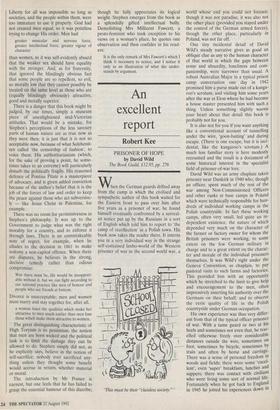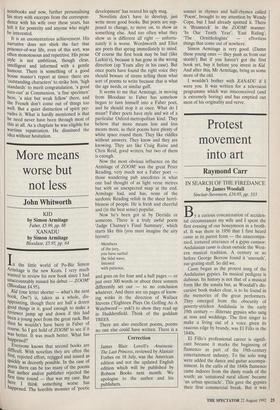Al excellent report
Robert Kee
PRISONER OF HOPE by David Wild The Book Guild, f12.95, pp. 276 hen the German guards drifted away from the camp in which the civilised and sympathetic author of this book waited for the Eastern front to pass over him after five years as a prisoner of war, he found himself eventually confronted by a surreal- ist notice put up by the Russians in a sort of English which told him to report to 'the camp of recollection' in a Polish town. His book now takes the reader there. It interns you in a very individual way in the strange self-contained limbo-world of the Western prisoner of war in the second world war, a
M11.11 be their "classless society." '
world whose end you could not foresee; though it was not paradise, it was also not the other place (provided you stayed under the control of the German armed forces), though the other place, particularly in Poland, was not far off.
One tiny incidental detail of David Wild's steady narrative gives as good an oblique clue as any to the human character of that world in which the gaps between sense and absurdity, loneliness and com- panionship, were narrower than usual. A robust Australian Major in a typical prison camp conversation one day in 1942 promised him a purse made out of a kanga- roo's scrotum, and visiting him some years after the war at Eton where he had become a house master presented him with such a thing. Unless something slightly warms your heart about that detail this book lS probably not for you.
It is also not for you if you want anything like a conventional account of tunnelling under the wire, 'goon-baiting' and daring escape. (There is one escape, but it is inci- dental, like the kangaroo's scrotum.) A much less familiar story is here modestly recounted and the result is a document of some historical interest in the specialist field of prisoner-of-war lore.
David Wild was an army chaplain taken prisoner near Dunkirk in 1940 who, though an officer, spent much of the rest of the war among Non-Commissioned Officers and other ranks at base camps in Poland which were technically responsible for hun- dreds of individual working camps in the Polish countryside. In fact these working camps, often very small, led quite an in- dependent existence, the nature of which depended very much on the character of the farmer or factory owner for whom the British prisoners were working, to some extent on the few German military in charge and to a great extent on the charac- ter and morale of the individual prisoners themselves. It was Wild's right under the Geneva Convention, as chaplain, to paY pastoral visits to such farms and factories. This provided him with an opportunity which he stretched to the limit to give help and encouragement to the men, often impressively asserting his authority over the Germans on their behalf, and to observe the eerie quality of life in the Polish countryside under German occupation. His own experience was thus very differ- ent from that of the typical officer prisoner of war. With a tame guard or two at his heels and sometimes not even that, he trav- elled otherwise freely over considerable distances outside the wire, sometimes on foot, sometimes by bicycle, sometimes by train and often by horse and carriage. There was a sense of personal freedom in woods and fields; there were some 'excel- lent', even 'super' breakfasts, lunches and suppers; there was contact with civilians who were living some sort of normal life. Fortunately when he got back to England in 1945 he jotted his experiences down in notebooks and now, further personalising his story with excerpts from the correspon- dence with his wife over these years, has left it for posterity and anyone who might be interested.
It is an unostentatious achievement. His narrative does not shirk the fact that prisoner-of-war life, even of this sort, was often monotonous and repetitive. His prose style is not ambitious, though clear, intelligent and informed with a gentle humour. There is something of a good house master's report at times: there are `outstanding characters' to strike him, 'high standards' to merit congratulation, 'a good turn-our at Communion, 'a fine specimen' here, 'a nice but weak fellow' there, and the French don't come out of things too well. But a quiet distinction of spirit per- vades it. What is hardly mentioned is that he need never have been through most of this at all. As a chaplain he was eligible for wartime repatriation. He dismissed the idea without hesitation.











































 Previous page
Previous page